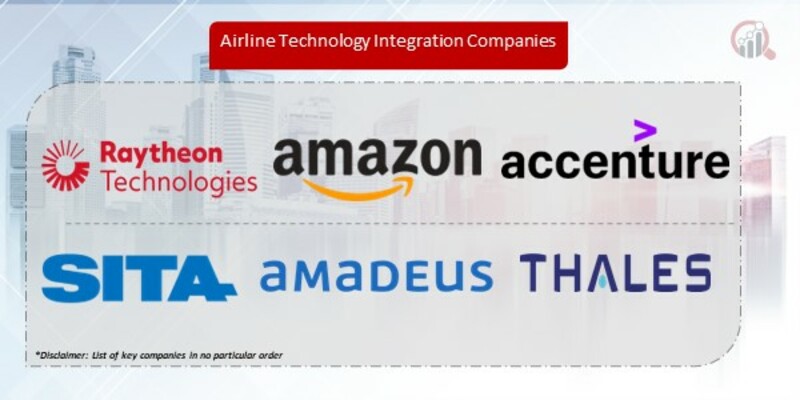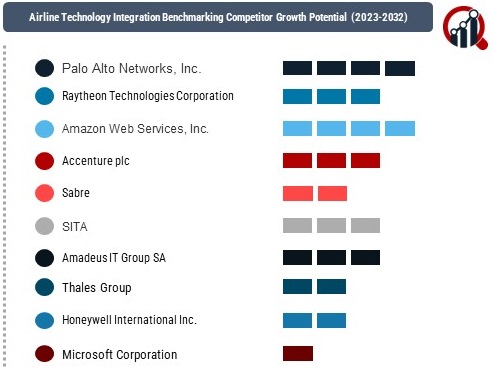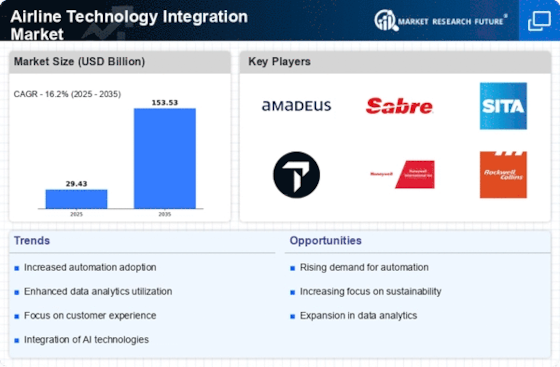Top Industry Leaders in the Airline Technology Integration Market

The Airline Technology Integration Market is a crucial segment within the aviation industry, facilitating the seamless integration of advanced technologies to enhance operational efficiency and passenger experience. Analyzing the competitive landscape provides insights into key players, their strategies, and recent developments in this pivotal market.
Strategies Adopted by Key Players Airline Technology Integration Market
Palo Alto Networks, Inc.
Raytheon Technologies Corporation
Amazon Web Services, Inc.
Accenture plc
Sabre
SITA
Amadeus IT Group SA
Thales Group
Honeywell International Inc.
Microsoft Corporation
The Airline Technology Integration Market employ various strategies to maintain a competitive edge. These strategies encompass technological innovation, strategic partnerships, market diversification, and a customer-centric approach. Amadeus, for example, focuses on continuous technological innovation, offering airlines cutting-edge solutions for reservations, inventory management, and departure control systems. Strategic partnerships with airlines and other technology providers ensure comprehensive and tailored solutions. Market diversification involves expanding service offerings to cover a wide range of airline needs, from backend operations to passenger-facing services.
Market Share Analysis:
The Airline Technology Integration Market is influenced by factors such as the breadth of technology solutions offered, adaptability to varying airline sizes, reliability, and customer support. Companies excelling in providing scalable and versatile technology solutions that cater to the diverse needs of airlines are strategically positioned to capture larger market shares. Establishing strong relationships with airline clients, ensuring the seamless integration of technologies, and staying ahead in terms of innovation and adaptability are crucial factors for maintaining a competitive edge in this rapidly evolving industry.
News & Emerging Companies:
The Airline Technology Integration Market has witnessed the emergence of new entrants and innovative companies. Emerging players, such as Flyr Labs and Volantio, have gained attention for their focus on predictive analytics, dynamic pricing, and passenger experience solutions. These emerging companies contribute to the market by introducing agile and specialized technologies, addressing the evolving demands of the airline industry, particularly in the areas of revenue optimization and customer engagement.
Industry Trends:
The Airline Technology Integration Market highlights ongoing investment trends, with a strong emphasis on data analytics, artificial intelligence (AI), and cloud-based solutions. Companies invest significantly in developing advanced analytics tools that enable airlines to make data-driven decisions related to pricing, route optimization, and operational efficiency. The integration of AI in passenger services, including chatbots and virtual assistants, reflects the industry's commitment to enhancing customer interactions. Investments in cloud-based solutions aim to provide airlines with scalable and flexible technology infrastructure, ensuring seamless integration and efficient operations.
Competitive Scenario:
The Airline Technology Integration Market is characterized by intense competition among established players and the entry of innovative newcomers. As airlines increasingly prioritize digital transformation and technology integration, companies strive to differentiate themselves by offering comprehensive, scalable, and future-proof solutions. Established players leverage their experience, global presence, and extensive service portfolios to maintain market share, while emerging companies focus on niche markets and specialized services. The market dynamics are influenced by the pursuit of technological advancements, market diversification, and responsiveness to the evolving needs of airlines.
Recent Development
The Airline Technology Integration Market witnessed a significant development as SITA announced the successful implementation of its cloud-based passenger services system (PSS) for a major global airline. The implementation marked a milestone in cloud-based technology adoption within the airline industry, showcasing the benefits of scalability, flexibility, and cost-effectiveness. This development underscores SITA's commitment to providing innovative solutions that address the challenges of modern airline operations. The successful implementation is expected to contribute to the overall trend of airlines adopting cloud-based technologies for enhanced operational efficiency, streamlined passenger services, and adaptability to changing market conditions.












